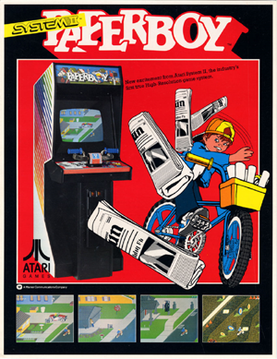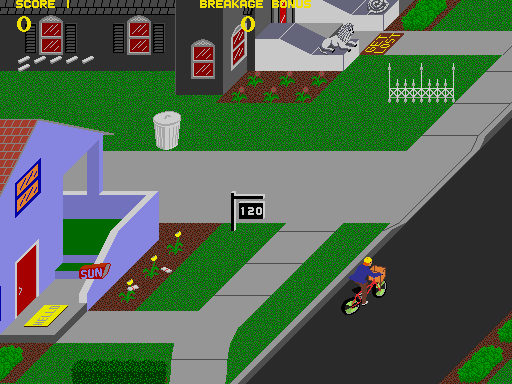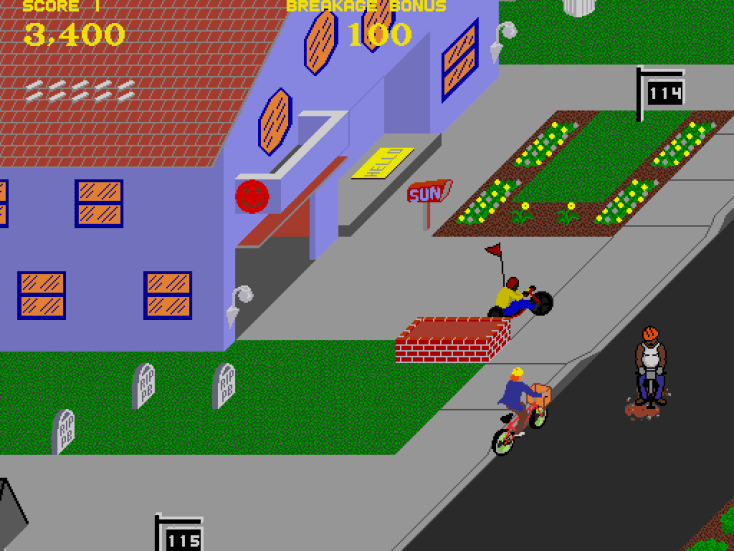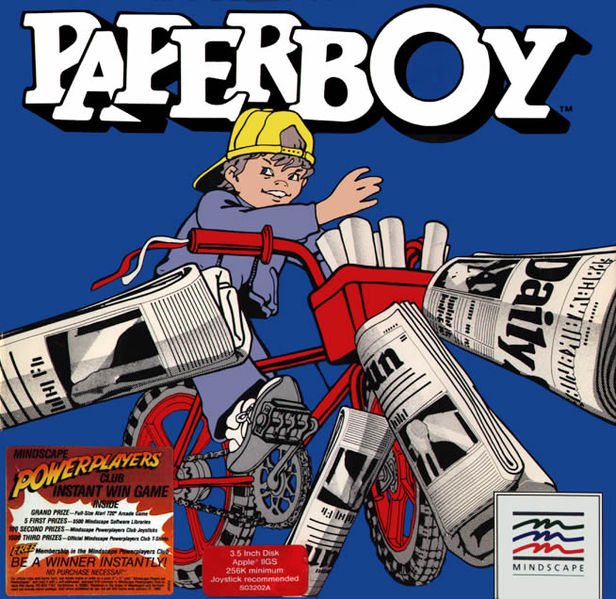Paperboy: an arcade action game about the mundane turned recreational, imposed a sense of fun into something that was generally considered a boring job. Created by Atari Games and Midway Games in 1985, Paperboy was released as a single or multi-player arcade game that allowed the players to take the role of a paperboy on a bicycle delivering copies of The Daily Sun within suburban streets. Although the premise of the game was to deliver the newspapers correctly to the subscriber’s houses in order to rack up points, another way to be able to collect points was by vandalizing the houses of non-subscribers and evading street hazards. Though initially presented as a game about the fun of being a paperboy, the game itself creates a stigma around the ideas of suburban living and the implications of being within certain societal groups due to socioeconomic class.

Playing off of the idea of a gated community, the game itself makes an “in” and an “out” group based on the people who are either subscribed or unsubscribed to the newspaper. The houses within the community are separated by the colors of the houses. Although the subscribers’ houses are varied in color (usually lighter colors), the houses of the non-subscribers are painted in a bright red color, and all look the same. The objective of vandalizing the non-subscriber’s houses in order to gain more points presents itself then as a moral issue; you are absolutely able to obtain the number of points to be order to pass the level by solely delivering all the newspapers to the correct houses without damaging them, but you can get even more points by damaging the non-subscribers houses (which is also easier). The level of separation is not just remotely limited to then the ability to afford a newspaper subscription, but also is related to how you are treated within the community if you cannot afford it. Without being able to contribute to the neighborhood economy, you are treated as someone who doesn’t belong, and there is now an allowance for other people to be able to treat you however they want.

The idea of Paperboy also plays off of the idea of belonging. Within the paper route, there are specific hazards that the player must be aware to avoid in the process of delivering the papers for the fear of losing on of their limited lives. However, herein lies the idea of what does or does not belong within the realm of what they defined as a suburban community. Although there does exist some funny aspects of the hazards presented (such as the grim reaper) most of the hazards presented exist in the form of people. For example, skateboarders, old ladies running after you, breakdancing people, and fast driving cars exist as some of the hazards, usually placed in very regular situations such as on the street or on the sidewalk. However, the expectation for dealing with these so-called “hazards” exists in either avoidance (swerving away from them) or in aggression (hitting them with a newspaper) which will stun them leading to reward on the player’s end. The ultimate reality of the game is that the rules of the suburban dream exist to cause as much harm to the outside group, the people who don’t ultimately belong, as possible without repercussions.

With a continuous scene that doesn’t allow you much time to think about whether to throw newspapers or stun the hazards, you are forced into making a quick decision. There is no time to contemplate the morality of what you should do versus what you want to do, and so in that way, there is a real-life aspect to playing the game. Not only are you trying to hurriedly complete your goal of delivering all the newspapers without risking your life, but you are also trying to decide if it’s worth it to harm others within the “out-group” to add more points to your total score. The harming factor is described by other players as a way of producing “comedic relief”, but the aspect of social commentary, specifically pertaining to members of the out-group within society, especially relating to the public’s perception of their role in the society (useless and in the way of our main goals) or how we are allowed to treat them if we do happen upon others unlike us (stunning them or avoiding them completely) is one to be considered. Paperboy makes us question our decisions on a smaller scale than in real life, but still causes us to make a decision based on our moral standards: if it were up to you, would you choose to stun or avoid the outsiders?
Bibiliography:
- Gerstmann, Jeff. “Paperboy Review.” GameSpot, GameSpot, 15 Feb. 2007, https://www.gamespot.com/reviews/paperboy-review/1900-6165947/.
- “Paperboy (Video Game).” Wikipedia, Wikimedia Foundation, 10 Oct. 2021, https://en.wikipedia.org/wiki/Paperboy_(video_game).

